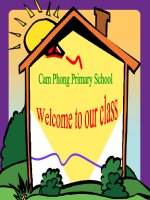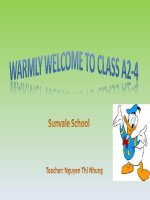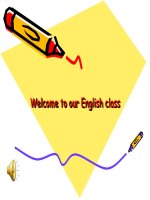unit 8 celebrations tiếng anh 9 sách cũ nguyễn văn liệt thư viện giáo án điện tử
Bạn đang xem bản rút gọn của tài liệu. Xem và tải ngay bản đầy đủ của tài liệu tại đây (121.79 KB, 3 trang )
<span class='text_page_counter'>(1)</span><div class='page_container' data-page=1>
Period: 57
<b>UNIT 9 : NATURAL DISASTERS</b>
<b>SPEAK + LISTEN</b>
<b>I. Objectives</b>
<i><b>1. Knowledge, Skills, Attitude: </b></i>
<i><b>a. Knowledge:</b></i>
- By the end of this lesson, Ss talk about preparations for a typhoon and listen to an expert on how to live
with earths and complete the table.
<i><b>- Vocabulary: Related to natural disasters.</b></i>
<i><b>- Grammar: I think we should … .</b></i>
<i><b>b. Skills: Speaking, listening, less reading and writing.</b></i>
<i><b>c. Attitude: Ss will be educated about natural disasters.</b></i>
<i><b>2. Capacity is formed and developed for students</b></i>
- Self-learning capability.
- Communicative competence
- Cooperation capacity
<b>II. Preparation</b>
<i><b>1. Teacher: lesson plane, book, color chalks, pictures, MP3</b></i>
<i><b>2. Students: books, notebooks, pen, ruler …</b></i>
<b>III. Students’ activities</b>
<i><b>1. Warm up (5’)</b></i>
<i><b>Teacher’s and students’ activities</b></i> <i><b>Content</b></i>
- T asks, Ss answer the question. If there is a typhoon, what should you prepare?
<i><b>2. Knowledge formation activities (32’)</b></i>
- T explains the requirement.
- Ss read suggested ideas and choose suitable ones.
- T calls some Ss to give the answers.
- T checks the answers.
- T explains the requirement and has Ss read the
example on page 77.
- T gives Ss more guiding questions.
- Ss pay attention to teacher.
- Ss practice speaking in pairs.
- T calls some pairs of Ss to talk before the class.
- T checks and corrects the mistakes if necessary.
- T asks, Ss answer the questions.
<b>3. Speak.</b>
<i>* Ss talk about preparations for a typhoon .</i>
<b>a. Check (v) what preparations you think </b>
<b>should be made for a typhoon.</b>
<b>Answer keys :</b>
- Buying some canned food.
- Buying matches.
- Filling all buckets with water.
- Filling all buckets with water.
- Buying a ladder.
- Checking all the windows and door latches.
<b>b. Now work with a partner. Talk about </b>
<b>what you think you want to buy and do to </b>
<b>prepare for a typhoon, explain why. The </b>
<b>ideas in the box may help you.</b>
<b>Ex: page 77.</b>
<b>Guiding questions :</b>
- Why do we need to buy food?
- Do we need rice?
- Will we need bottle of water?
- Why do we need to fill buckets with water?
- Do we need anything else?
- Have you ever made any activities like this?
- Do you think these activities are necessary?
- T introduces the listening and explains the way to
complete the table.
- Ss pay attention to teacher.
<b>II. Listen.</b>
</div>
<span class='text_page_counter'>(2)</span><div class='page_container' data-page=2>
- T plays the tape three times.
- Ss listen to the tape and complete the table.
- Ss compare the answers in pairs.
- T calls some Ss to give the answers before the
class.
- T checks and corrects the answers if necessary.
<i><b>An expert is giving a talk on how to live with </b></i>
<i><b>earthquakes. Listen to the talk, then complete </b></i>
<i><b>the table.</b></i>
<b>Answer keys :</b>
1. bottom shelf of your bookshelf.
2. fridge … washing machine
3. mirrors
4. a window
5. inside
6. under a strong table … door way
7. corner of a room.
- T asks, Ss answer the question. Do you think this information is very usefull?
<i><b>3. Consolidation (4’)</b></i>
T calls some Ss to talk about their preparations for a typhoon and explain why and then talk about how
to live with earthquake.
<b>IV. Experience:</b>
………
………
………
Period: 58
<b>UNIT 9: NATURAL DISASTERS</b>
<b>READ</b>
<b>I. Objectives</b>
<i><b>1. Knowledge, Skills, Attitude: </b></i>
<i><b>a. Knowledge:</b></i>
- By the end of the lesson, Ss read a passage about natural disasters such as earthquakes, tidal waves,
typhoons, volcanoes, and tornadoes and choose statements and complete the sentences.
<i><b>- Vocabulary: </b></i>Related to natural disasters.
<i><b>- Grammar: Present simple tense (review)</b></i>
<i><b>b. Skills: listening, speaking, reading and writing</b></i>
<i><b>c. Attitude: Ss will be educated about natural disasters.</b></i>
<i><b>2. Capacity is formed and developed for students</b></i>
- Self-learning capability.
- Communicative competence
- Cooperation capacity
<b>II. Preparation</b>
<i><b>1. Teacher: lesson plane, book, color chalks, pictures, MP3</b></i>
<i><b>2. Students: books, notebooks, pen, ruler …</b></i>
<b>III. Students’ activities</b>
<i><b>1. Warm up (5’)</b></i>
<b>Teacher’s and Ss’ activities</b> <b>Content</b>
<b>* Warm up: Matching </b>
- Teacher gives definition of
four natural disasters that Ss
will learn in the lesson.
- Students give definition.
- Teacher gives correct answers
- Work in group
a. Mountain or hill with openings through which
ashes and gases ejected. 1. Earthquake
b. Violent storm especially in East Asian seas. 2. Tidal wave
c. Violent storm over small area. 3. Typhoon
d. Another word for Sunami, waves caused by tides 4. Volcano
e. Sudden and violent movements of the earth’<sub>s </sub>
surface. 5. Tornado
<i><b>* Answers:</b></i>
1.e , 2.d ,3.b ,4a ,5.c
</div>
<span class='text_page_counter'>(3)</span><div class='page_container' data-page=3>
- Teacher introduces the aims of the
lesson and some new words to Ss.
- Teacher sets the scene “We are going to
read a passage about five disasters that
mentioned earlier. Read and do the
comprehension tasks assigned”
<b>3. Reading:</b>
<i>* Ss read a passage about natural disasters and choose </i>
<i>statements and complete the sentences.</i>
<i><b>* Vocabulary</b></i>
- Pacific Rim (n): Countries in the Pacific area.
- Collapse ( v) : break down , falling to ruin
- Abrupt (v) : Suddenly happen
- Shift : change
- Hurricane = Cyclone = Typhoon
- Erupt (v) – Eruption ( n) : break out or through
- Funnel (n): narrowing tube for putting liquid into small
opening.
- Baby carriage (n): small, special vehicle for carrying
baby.
<b>- Teacher asks Ss to do the exercise. True</b>
<b>or False.</b>
- T asks ss to work independently, read
the passage and decide whether the
statements are true or false. Correct the
false ones.
The tidal wave traveled from
Alaska to California
The eruption of Mount
Pinatubo is the World’<sub>s largest</sub>
volcano eruption in more than 50
years.
- Ss work individually.
- T calls on some Ss to write their answers
in front of class.
- T gives the correct ones.
-T asks Ss to read the passage more
carefully and complete the sentences. T
guides and explains ss to understand all
the given halves.
- T makes necessary corrections in front
of class.
- T gives suggested answers:
<i><b>* Answers:</b></i>
1...occur around the Pacific rim.
2...many houses, office blocks and high ways
collapsed.
3...when there is an abrupt shift in the underwater
movement of the earth.
4...a cyclone.
5...the word “ typhoon “
6...that passes overland below a thunderstorm and
suck up anything that is in its path.
<i><b>3. Consolidation (4’)</b></i>
- T calls on some Ss to read the sentences aloud in front of class.
- T checks pronunciation mistakes if necessary.
<b>IV. Experience:</b>
………
………
………
<b>Signature of the Leader</b>
Week 29:...
T F
1 <sub></sub>
2 <sub></sub>
3 <sub></sub>
4 <sub></sub>
5 <sub></sub>
</div>
<!--links-->









